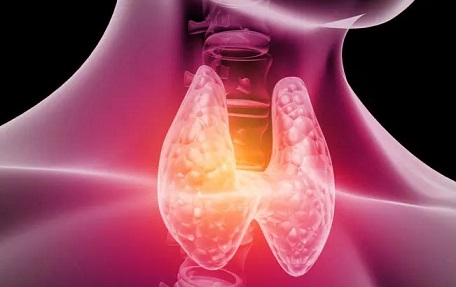Nikhil Prasad Fact checked by:Thailand Medical News Team Jul 16, 2024 1 year, 5 months, 1 day, 22 hours, 5 minutes ago
COVID-19 News: Recent studies have unveiled a critical connection between COVID-19 and thyroid dysfunction, particularly with the emergence of the Omicron variant. Researchers from Renmin Hospital of Wuhan University, China, have conducted an extensive study to explore how thyroid dysfunction influences the severity and mortality of COVID-19. This
COVID-19 News report delves into their findings, providing an accessible overview for the general public.
 How Omicron and thyroid dysfunction impact COVID-19 severity and mortality
Study Background
How Omicron and thyroid dysfunction impact COVID-19 severity and mortality
Study Background
The SARS-CoV-2 virus, responsible for COVID-19, has been found to invade various organs, including the thyroid gland. This study aimed to assess the risk of thyroid dysfunction during the prevalence of the Omicron variant and its correlation with COVID-19 outcomes. Moreover, it sought to determine if thyroid dysfunction persisted during the recovery phase of COVID-19.
Study Methodology
The researchers conducted a retrospective cohort study, analyzing thyroid function in COVID-19 patients using serum FT3, FT4, and TSH concentrations. They utilized multivariate logistic regression and causal mediation analysis to explore the relationships among thyroid disease, COVID-19 severity, and ESS. The study was approved by the Ethics Committee of Renmin Hospital of Wuhan University.
Key Findings
The study included 1,505 COVID-19 patients admitted to Renmin Hospital of Wuhan University from December 2022 to January 2023. Among these patients, 111 had pre-existing thyroid conditions. The researchers compared COVID-19 outcomes between patients with and without thyroid disease, categorizing them based on the severity of the disease and survival outcomes.
Thyroid Disease and COVID-19 Outcomes:
-Patients with a history of thyroid disease did not exhibit significant differences in COVID-19 severity or mortality compared to those without thyroid disease.
-Age was a significant risk factor for severe COVID-19 and mortality, while female gender appeared to be protective.
-Pre-existing thyroid disease, whether hyperthyroidism or hypothyroidism, did not influence COVID-19 outcomes.
Severity of COVID-19 and Thyroid Dysfunction:
-Severe COVID-19 was associated with lower levels of thyroid-stimulating hormone (TSH), free triiodothyronine (FT3), and free thyroxine (FT4).
-The prevalence of thyroid dysfunction, particularly euthyroid sick syndrome (ESS), increased with the severity of COVID-19. ESS was a strong risk factor for COVID-19 mortality.
Thyroid Dysfunction and Mortality:
-Patients with ESS and lower levels of FT3 and FT4 were more likely to succumb to COVID-19.
-High levels of FT3 and FT4 provided a protective effect against COVID-19 mortality, especially in women.
<
br />
Thyroid Function During Recovery:
-During the recovery phase, hyperthyroidism was rare, but a small percentage of individuals continued to exhibit hypothyroidism.
-Thyroid function generally returned to baseline levels after recovery, although some patients remained at risk for hypothyroidism.
Implications of the Findings
The study underscores the importance of monitoring thyroid function in COVID-19 patients, particularly those with severe illness. The significant increase in ESS among severe cases highlights the need for proactive thyroid management to improve patient outcomes. The protective effect of high FT3 and FT4 levels against COVID-19 mortality suggests potential therapeutic avenues for managing thyroid hormone levels during COVID-19 treatment and recovery.
Conclusion
This study illuminates the intricate relationship between COVID-19 and thyroid dysfunction, particularly during the Omicron variant pandemic. The findings emphasize the critical role of thyroid function in determining COVID-19 severity and mortality. Healthcare providers should be vigilant in monitoring and managing thyroid dysfunction in COVID-19 patients to enhance their chances of recovery.
The study findings were published in the peer-reviewed journal: Frontiers in Endocrinology.
https://www.frontiersin.org/journals/endocrinology/articles/10.3389/fendo.2024.1412320/full
For the latest
COVID-19 News, keep on logging to Thailand Medical News.
Read Also:
https://www.thailandmedical.news/news/viral-infections-including-covid-19-and-thyroid-cancer-a-new-threat-emerges
https://www.thailandmedical.news/news/warning-covid-19-mrna-vaccines-can-cause-subacute-thyroiditis
https://www.thailandmedical.news/news/covid-19-news-doctors-from-west-virginia-warn-that-sars-cov-2-infections-can-lead-to-thyroid-storms
https://www.thailandmedical.news/news/covid-19-news-italian-and-dutch-imaging-study-involving-18f-fdg-pet-ct-reveals-that-sars-cov-2-impairs-thyroid-and-adrenal-glands-functions
https://www.thailandmedical.news/news/covid-19-news-italian-researchers-warn-that-sars-cov-2-can-cause-autoimmune-thyroid-diseases-aitd
https://www.thailandmedical.news/news/breaking-news-french-physicians-uncover-malignant-pseudothyroiditis,-a-new-type-of-thyroid-cancer-in-a-post-covid-individual
https://www.thailandmedical.news/news/breaking-news-thai-study-reveals-alarming-rate-of-about-20-2-percent-of-covid-19-patients-found-with-thyroid-incidentalomas
https://www.thailandmedical.news/news/covid-19-news-study-shows-that-sars-cov-2-infections-causes-thyroxine-fluctuations
https://www.thailandmedical.news/news/long-covid-italian-researchers-warn-that-sars-cov-2-induced-thyroid-dysfunction-can-linger-on-for-more-than-a-year
https://www.thailandmedical.news/news/breaking-cso-from-london-medical-laboratory-warns-that-thyroid-issues-escalating-rapidly-in-the-united-kingdom-could-be-due-to-omicron-or-previous-var
https://www.thailandmedical.news/news/covid-19-latest-yet-another-study-showing-effects-of-sar-cov-2-on-the-thyroid-gland-including-thyrotoxicosis
https://www.thailandmedical.news/news/breaking-covid-19-research-new-study-reveals-that-sars-cov-2-coronavirus-also-affects-thyroid-functions-in-majority-of-covid-19-patients
https://www.thailandmedical.news/news/warning-covid-19-patients-could-also-develop-thyroid-infections
https://www.thailandmedical.news/news/global-misuse-of-antihistamines-and-dangers-of-long-term-usage
